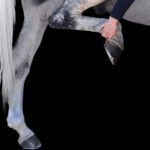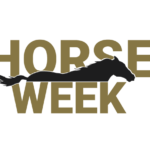
When the 2017 EQUUS Professional Horseman contest was announced, readers responded with 96 entries extolling the virtues of their favorite trainers, veterinarians, farriers or stable managers. From all of these worthy professionals, Russell Hennig of Pine Bush, New York, was chosen to receive the award.

If you’ve ever dealt with a fidgety horse―and who among us hasn’t?―nominator Charron Klotz’s winning essay will resonate with you. “Russ is such a calm and quiet person,” the Monroe, New York, resident wrote. “My horse used to dance in the aisle while she was getting her trim. Then, her first day with him―a windy, driving-rain day―he walked up to her, gave a little hello and a pat, and she stood still, calm. He has also helped my friends and their horses, too. Easy to complicated, I have watched him do it all with a quiet and knowledgeable hand.”
Both Hennig and Klotz will receive prize packages worth over $700 from contest sponsors Nutramax (Cosequin), USRider, Freedom Health (Succeed), SSG Gloves and HorseTech.

Here’s a brief interview with our contest winner:
1. Tell us a little about your background in horses. When and where did you start out shoeing horses?
I always had horses growing up. When I was 14, I saved enough money to buy a Belgian draft horse, Bud. Bud and I competed in 4-H, performed in drill team, participated in the Hudson Valley Draft Horse Assn. plowing competitions, and completed some logging for firewood. He was a great horse.
Unfortunately, he was diagnosed with canker, and the farriers around me wouldn’t work with him. His lameness became so severe, he had to be euthanized. This spurred my desire to go to farrier school, so that I could help other horses like Bud.
I finished farrier school when I turned 17 and started straightaway working on neighbors’ and friends’ horses. I have been fortunate enough in my career so far to work on and help save several horses with canker.
2. What types of horses do you generally shoe?
The majority of the horses I work on are riding horses―English, Western, pleasure and performance horses. I also work on draft horses used for driving.
My main passion is therapeutic work. I work closely with Pine Bush Equine veterinary practice, Rhinebeck Equine veterinary practice and other veterinarians to fix and stabilize various lamenesses and ailments of the hoof. These lameness can include laminitis, canker, keratoma, hoof resections, white-line disease, navicular, high/low syndrome and embedded foreign objects. I have also made special shoes/braces to support horses with broken legs and tendon issues.
3. Has farrier work changed much since you started out? If so, what are the biggest changes you’ve witnessed?
Farrier work, like many other horse-related occupations, is constantly evolving and improving. The technology in regard to shoes, pads, nails and hoof-care products has become more geared toward keeping horses healthy and performing longer into their lives.
4. What do you like best about farrier work, and what do you find the most challenging?
I like the horses the best! I love working with horses every day―meeting them, getting to know them and doing my best to help them have a great farrier experience. I want to help them perform to their best ability.
The most challenging part of my job is honestly the owners and billing.
5. You’ve been described as a quiet person who has a calming way with fidgety horses. What do you think is your secret?
I am proud to be described in this way, as my outlook toward the horses is compassionate. Every day is a new day, and even if the horse had a hard time our previous appointment, or with a former farrier, I treat him as if it is a clean slate this time. Horses have bad days and bad experiences, just like us. They deserve to be treated with respect and courtesy.
Horses can be trained to respect the farrier and not fear him. When I am working on a horse, my mindset is that we both have a job to do, and let’s get it done as efficiently and as safely as possible!
6. If you could give horse owners a few tips about caring for their horses’ hooves, what would they be?
The first tip is about the actual service: Owners should remember farriers smell like a hundred other horses, which could set them off; be calm to help your horse be calm.
The second tip is to pick your horses’ feet regularly, to remove debris, manure and dirt, and to keep your horses used to picking their feet up on command.





